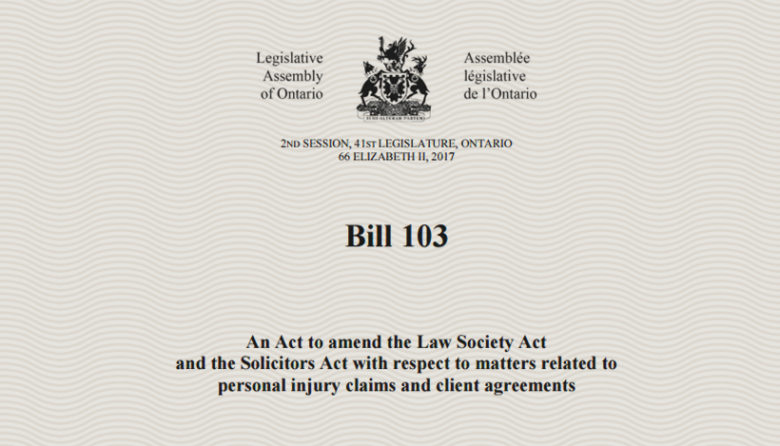If you have been hurt in an accident caused by someone else’s negligence, you may have a right to seek compensation by way of a personal injury lawsuit. How do I bring a claim? Your lawyer will draft the document that starts the lawsuit, which is called the “Statement of Claim”. The Statement of Claim includes: The date(s) of the accident/injury; How the accident occurred; …
Bill 103: Another Slap in the Face for Injured Victims
On March 8, 2017, Ontario MPP Mike Colle introduced Private Member’s Bill 103, An Act to amend the Law Society Act and the Solicitors Act with respect to matters related to personal injury claims and client agreements in legislature. Bill 103 set out a number of prohibitive measures including the capping contingency fee agreements at 15% of the award, banning referral fees in personal injury …
How Will Reforms to Impaired Driving Laws Impact Ontario Insurance Coverage?
On April 13, 2017, the Federal Government announced long-anticipated plans to legalize marijuana in Canada. Along with that announcement came the most sweeping proposed reforms to Canada’s impaired driving laws seen in decades. This article will attempt to forecast possible insurance coverage pitfalls if and when these laws are in place, based on the current law in Ontario. Generally, you purchase insurance to cover a …
Who’s Liable After a Dog Attack?
Under Ontario’s Dog Owners’ Liability Act, the owner of a dog is liable for damages resulting from a bite or attack by the dog on another person or domestic animal. This may sound straightforward, but depends entirely on the definition of the dog’s “owner”.
Why are we paying for doctors’ malpractice?
The Canadian Medical Protection Association describes itself as “a not-for-profit mutual defence association.” Even though it acts as an insurer, providing resources to help manage risk and assistance when medical-legal difficulties arise, the CMPA is technically not an insurer.
The Jury Selection Process and Juror Responsibilities
The trial of former NFL star Aaron Hernandez was interrupted after a user of an online forum published details of the case. Certain responsibilities – such as juror discretion – are integral to the administration of justice. This post explores how juries are selected and expected to act.

